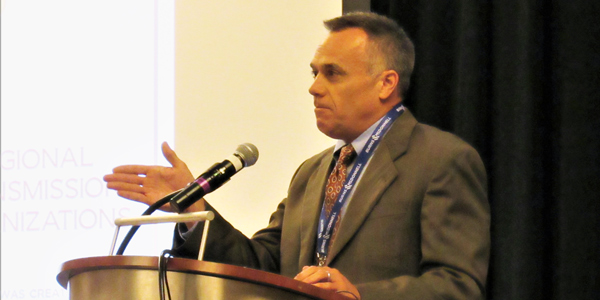By Amanda Durish Cook and Rich Heidorn Jr.
The Missouri Supreme Court ruled Tuesday that the state Public Service Commission can issue the Grain Belt Express transmission project a certificate of convenience and necessity (CCN) without obtaining consent from each impacted county (SC96993).
The unanimous decision cleared one obstacle hindering Clean Line Energy Partners’ embattled, $2.3 billion, 780-mile line, which would transmit Kansas wind generation through Missouri and Illinois to PJM at the western border of Indiana.
“We think this is obviously a huge step forward,” Clean Line President Michael Skelly said in an interview.
Missouri regulators rejected Grain Belt Express in 2017, citing precedent from a state Court of Appeals’ decision that certificates require consent from each county affected by the proposed construction.
Although four of the five commissioners said they found the project worthy, they said their hands were tied by precedent, as the Caldwell County Commission refused to allow the transmission line to cross public roads. (See New Midwest Infrastructure Must Respect Trends, Experts Say.)
But the Supreme Court said the commission confused a line CCN — which does not require prior county assent — with an area CCN, which does. An area CCN would have been necessary if the Grain Belt Express was intended to supply retail service.
It concluded that the commission mistakenly analyzed the application under the wrong subsection of rules.
The court reversed the PSC’s decision and remanded the case back to the commission to issue a new order.
County Opposition Remains
The Supreme Court acknowledged that Clean Line will still need county assent to construct facilities impacting publicly owned roads under state law. “But such assent is not relevant to the commission’s decision in issuing a line CCN,” the court said.
The project would cross 206 miles through eight Missouri counties.
Landowner group Block Grain Belt Express Missouri said Tuesday that it will continue to lobby county commissioners to withhold approval. The group said the ruling was an “empty victory” and maintains that the line has little chance of success.
“We disagree with the decision of the Supreme Court and are disappointed by it. A ruling requiring county consent prior to approval by the PSC would have likely been the end of the road for Grain Belt Express. However, Grain Belt is still far from being approved and built. We will continue to fight for our farms and property rights and against unnecessary use of eminent domain,” the group’s Russ Pisciotta said in a statement.
Clean Line Optimistic
Clean Line’s Skelly told RTO Insider he didn’t expect problems winning counties’ approvals for road crossings. “We’ll work with the counties to figure that out,” he said. “You always have to have road-crossing agreements.”
Skelly said the company, which already has CCNs from Kansas and Indiana, is planning to refile its application in Illinois, where its certificate was rescinded by a state appellate court in March because it did not qualify as a public utility in the state. Illinois law requires that a public utility “owns, controls, operates or manages, within this state, directly or indirectly, for public use, any plant, equipment or property used or to be used for” public utility purposes.
“We believe that the Illinois commission recognized the need for new transmission, and we believe we will be able to craft a successful application in Illinois,” Skelly said.
“The courts have laid out a pretty clear path” for overcoming their objections, Skelly added. “It could be as simple as owning land. It could be teaming up with an Illinois-based utility. It could be owning a substation.”
Grain Belt’s DC-AC converter station is slated to be attached to American Electric Power’s Sullivan 765-kV substation in Illinois, near the Indiana border. “A lot of that power is going to end up in Illinois,” Skelly said.





